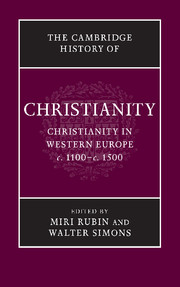Book contents
- Frontmatter
- Introduction
- PART I INSTITUTIONS AND CHANGE: 1100–1200
- PART II FORGING A CHRISTIAN WORLD, 1200–1300
- PART III THE ERECTION OF BOUNDARIES
- PART IV SHAPES OF A CHRISTIAN WORLD
- PART V CHRISTIAN LIFE IN MOVEMENT
- 20 On the margins of religious life: hermits and recluses, penitents and tertiaries, beguines and beghards
- 21 Saints and pilgrimages: new and old
- 22 Crusade and conquest
- PART VI THE CHALLENGES TO A CHRISTIAN SOCIETY
- PART VII REFORM AND RENEWAL
- Select bibliography
- Index
- Map 1 Western Europe c. 1100 – c. 1500
- Map 2 Universities of Europe
- References
21 - Saints and pilgrimages: new and old
from PART V - CHRISTIAN LIFE IN MOVEMENT
Published online by Cambridge University Press: 28 March 2010
- Frontmatter
- Introduction
- PART I INSTITUTIONS AND CHANGE: 1100–1200
- PART II FORGING A CHRISTIAN WORLD, 1200–1300
- PART III THE ERECTION OF BOUNDARIES
- PART IV SHAPES OF A CHRISTIAN WORLD
- PART V CHRISTIAN LIFE IN MOVEMENT
- 20 On the margins of religious life: hermits and recluses, penitents and tertiaries, beguines and beghards
- 21 Saints and pilgrimages: new and old
- 22 Crusade and conquest
- PART VI THE CHALLENGES TO A CHRISTIAN SOCIETY
- PART VII REFORM AND RENEWAL
- Select bibliography
- Index
- Map 1 Western Europe c. 1100 – c. 1500
- Map 2 Universities of Europe
- References
Summary
The Middle Ages did not invent the cult of saints, which already, by the end of Christian Antiquity, played an important role in the religious life of the faithful, through the cult rendered to the martyrs and the confessors. Yet this devotion was boosted in the Middle Ages to the point of making it one of the keystones of human relationships with the divine, as we still see today from the innumerable works of art of this period – paintings, sculptures, gold and silver work, windows – dedicated to the menservants and maidservants of God. This cult first took the form of festivals and liturgical ceremonies, which became steadily more numerous between the ninth and the fourteenth centuries. By the Carolingian period, in every church, the clergy celebrated the feasts of the Apostles and the Evangelists and also several universal feasts such as All Saints (1 November), St John the Baptist (24 June), St Laurence (10 August), St Michael (29 September), St Martin (11 November) and the Holy Innocents (28 December), added to which were commemorations specific to each church, that is, of its dedicatee and its patron saint or saints.
Keywords
- Type
- Chapter
- Information
- The Cambridge History of Christianity , pp. 324 - 339Publisher: Cambridge University PressPrint publication year: 2009
References
- 1
- Cited by

